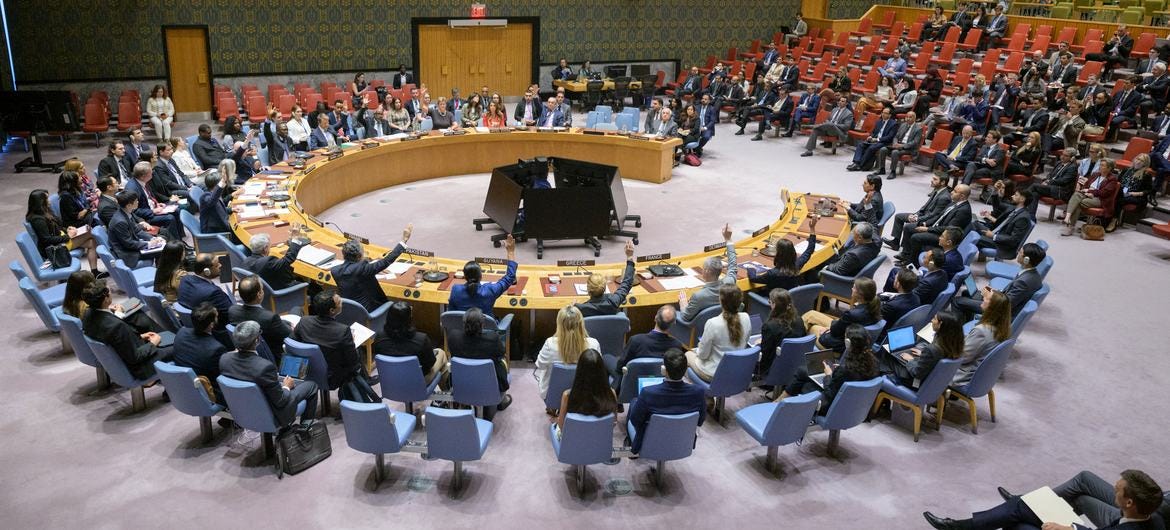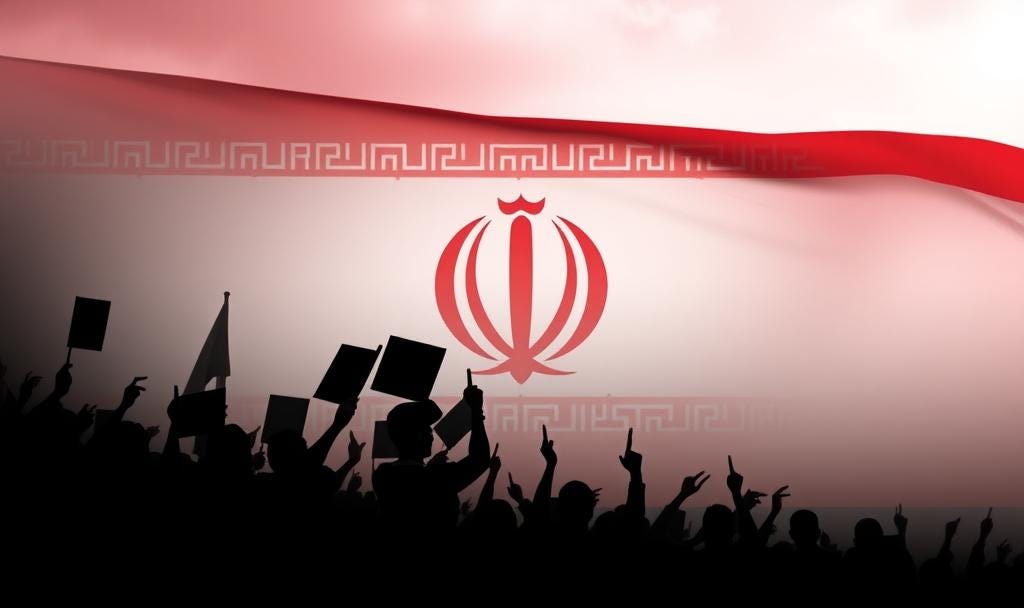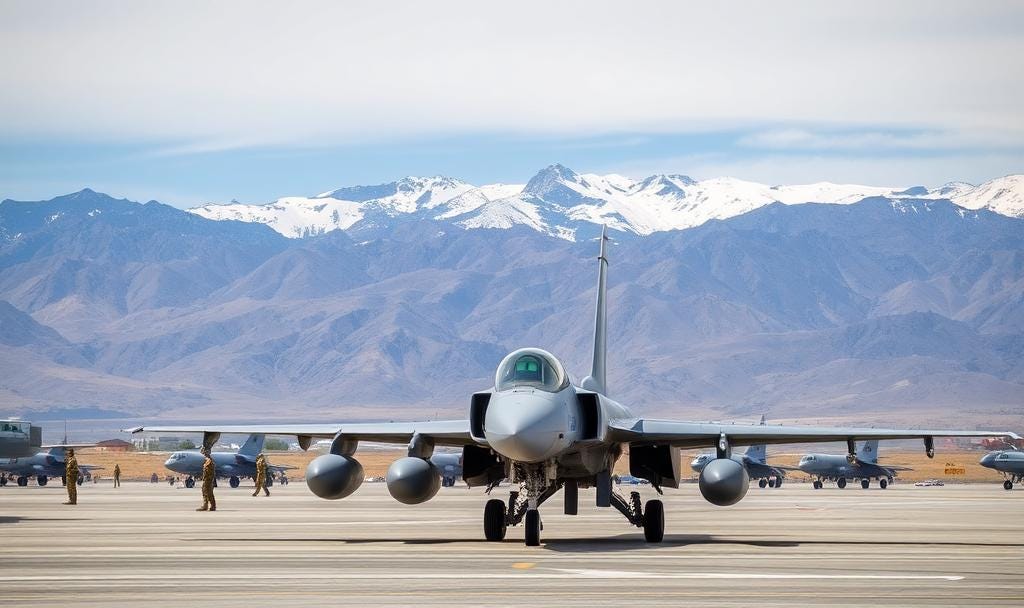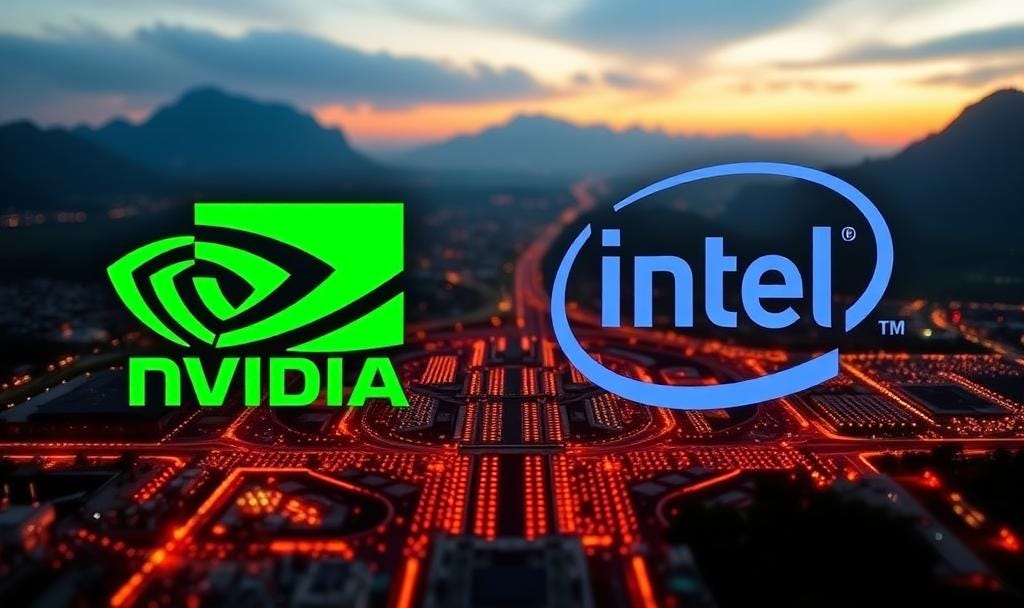10 Things Global News - 19th September 2025
The news from around the world
US Vetoes UN Gaza Ceasefire Resolution
Israeli Pushes Into Gaza Amid Blackout and Heavy Fighting
Trump Urges UK to Use Military for Border Control
UN Sanctions On Iran Poised To Return
Saudi Arabia and Pakistan Sign Defence Pact
Trump Says US Plans to Reclaim Bagram Air Base
Poland, Ukraine Seal Drone Warfare Partnership
Strikes Sweep France as Unions Protest Budget Cuts
EU Misses Climate Deadline as Australia Raises Target
Nvidia Invests $5bn in Intel, Forge Chip Partnership
On this day ……
On this day in 1893 New Zealand granted universal suffrage to women, the first country to do so.
The same rights were not conferred in other countries until much later: Canada - 1917, Germany -1918, UK - 1918 (if you were over 30 and owned property and 1928 for all women) and the USA in 1920.
French women had to wait until July 1944, Greeks until 1952 and Swiss women not until 1971.
Saudi women were granted the vote and the right to run for office (in local elections) in 2015.
The United States has vetoed a UN Security Council resolution calling for an immediate ceasefire in Gaza and the release of hostages, leaving it isolated against the 14 other members who backed the measure. Washington argued the text failed to condemn Hamas or recognise Israel’s right to defend itself, describing the move as “performative action designed to draw a veto.” The draft, tabled by 10 elected members, highlighted worsening famine and urged Israel to lift restrictions on aid deliveries.
UN Photo/Manuel Elías
The UN Security Council meets to discuss the situation in the Middle East.The vote coincided with intensified Israeli military action in Gaza City, where tanks and air strikes have forced thousands to flee south amid reports of hospitals on the brink of collapse.
Israel insists its campaign to destroy Hamas infrastructure will continue, while Palestinian representatives described the failed resolution as another blow to civilians enduring nearly two years of war. Several allies, including France and Britain, are preparing to recognise a Palestinian state later this month.
Sources: Associated Press, Le Monde, UN News
Israeli tanks and infantry advanced deeper into Gaza City on Thursday as internet and phone lines were cut across the enclave, a move widely seen as signalling a new phase of the war.
The Israeli military said the push involved infantry, armour and artillery backed by air power, with the aim of defeating Hamas and securing the release of hostages. Gaza’s health ministry reported at least 79–85 Palestinians killed in the past 24 hours, while Israel confirmed four soldiers dead in southern Gaza.
The telecommunications blackout, which partially eased later in the day, left civilians unable to communicate as strikes intensified. Israel has urged residents to flee towards designated humanitarian zones, but aid groups warn those areas lack food, shelter and medical capacity. Around 450,000 people have already left the city, yet hundreds of thousands remain trapped in makeshift encampments or damaged homes.
The two-year conflict has now killed more than 65,000 Palestinians, according to Gaza officials, and 48 hostages are still held inside the territory.
Sources: NY Post, Reuters
Donald Trump ended his second state visit to Britain by urging Prime Minister Keir Starmer to “call out the military” to stop illegal migration. At a press conference at Chequers, Trump said the UK faced a situation similar to the US and warned that uncontrolled migration “destroys countries from within.” Starmer, under domestic pressure over record Channel crossings, noted his government’s new “one in, one out” deal with France had already seen the first deportation carried out.
Despite disagreements over Palestinian statehood, both leaders emphasised unity, announcing a new technology pact that includes £2bn in US investment in UK firms. Trump also signalled a shift in tone on Ukraine, criticising Vladimir Putin for prolonging the war and urging NATO allies to stop buying Russian oil.
The visit, marked by royal pageantry, was used by Downing Street to highlight the “special relationship,” though critics questioned how far Britain’s influence extends in Washington.
Sources: The Guardian, BBC
The UN Security Council is expected to reimpose international sanctions on Iran after a vote that diplomats say will fall short of the nine required to keep them suspended. France’s President Emmanuel Macron said he expects sanctions to return by month-end, calling Iranian efforts to avoid the step “not serious.”
The move follows the European “E3” triggering a 30-day snapback in late August, accusing Iran of breaching the JCPOA, including a uranium stockpile more than 40 times the deal’s limit. Iran says the step is illegal and has threatened to leave the Nuclear Non-Proliferation Treaty if snapback proceeds.
Tensions have risen since the June war between Iran and Israel, after which Iran curtailed cooperation with the IAEA and inspectors left. Diplomats say the Council could still extend the suspension if Tehran and the Europeans reach a last-minute bargain, but talks so far show no concrete progress.
Sources: RFI, Al Jazeera
Saudi Arabia and Pakistan have signed a Strategic Mutual Defence Agreement that commits each to treat aggression against one as aggression against both. The deal was sealed in Riyadh by Crown Prince Mohammed bin Salman and Prime Minister Shehbaz Sharif, reflecting a decades-long military partnership that has ranged from training and troop deployments to counterterrorism and intelligence sharing.
Officials stressed the accord was the result of years of dialogue, not a reaction to a single event, though it comes amid heightened regional tension.
The pact underscores Gulf Arab doubts about US security guarantees, particularly after Israel’s strike on Qatar and Iran’s earlier attack, both of which unsettled regional allies. Pakistan, fresh from a brief military clash with India in May, is seen as bringing nuclear weight to the partnership.
Saudi officials emphasised that relations with India would continue to grow despite the agreement, which Riyadh presented as part of a broader bid for regional stability.
Sources: Arab News, CNN
President Donald Trump has said his administration is moving to retake Bagram Air Base in Afghanistan, claiming it is strategically vital because of its proximity to Chinese nuclear sites.
He described the initiative as “a little breaking news” during a press conference in Britain, arguing the withdrawal under Joe Biden was a “total disaster” that allowed the Taliban to take control. Afghan authorities deny Trump’s repeated allegation that the facility is now under Chinese influence, and Beijing insists it has no bases in Central Asia.
Bagram, once the largest US hub during the 20-year war, was vacated in 2021 and has since been controlled by the Taliban defence ministry. Trump gave no details of negotiations but said Afghan officials “need things from us.” Analysts caution that retaking the base would be unnecessary and risky, as Washington already possesses intelligence tools to monitor China and deploying forces would expose US troops to militant attacks.
Sources: South China Morning Post, Cato Institute
Poland and Ukraine are deepening defence ties after Russian drones entered Polish airspace, signing a memorandum in Kyiv to create a joint working group on uncrewed systems. The partners will develop and test interception methods, exchange battlefield expertise, and strengthen interoperability to meet NATO standards; joint training programmes and manufacturing projects are also planned.
Officials said the step responds to renewed drone pressure on Poland’s borders, where around 20 Russian drones crossed last week and were met by NATO jets, and to continued cross-border threats from Belarus. Warsaw has since tightened airspace controls, while NATO has pledged to reinforce the alliance’s eastern flank.
Kyiv and Warsaw also signed a broader defence cooperation agreement and a joint letter on expanding NATO’s new training and education centre in Poland, framing the initiative as a step to “a new level” of security cooperation across Europe.
Sources: NBC News, Notes from Poland
Hundreds of thousands of people joined nationwide strikes in France on Thursday to oppose budget cuts, with unions claiming turnout exceeded one million while the interior ministry put the figure at about 500,000. Public transport was heavily disrupted, pharmacies largely closed, and a third of teachers walked out, while students blocked schools and universities. Scuffles broke out in Paris, Lyon and Nantes, where riot police used tear gas against protesters after property damage was reported.
The protests came just a week after Sébastien Lecornu replaced François Bayrou as prime minister following his government’s collapse over a €44bn austerity plan. Lecornu has not renounced the cuts, insisting he is consulting widely, but union leaders say anger is directed at President Emmanuel Macron himself, whose popularity has slumped.
Officials deployed 80,000 police across the country, making more than 300 arrests, while union leaders vowed further mobilisation if the government refuses to shift course.
Sources: BBC, Le Monde
The European Union has admitted it will miss a United Nations deadline to set new emissions targets, after internal divisions blocked agreement on its 2035 and 2040 goals. Ministers from Germany, France and Poland demanded leaders first debate the 2040 benchmark at an October summit, forcing the bloc to send only a non-binding “statement of intent” pledging a cut of between 66% and 72.5% by 2035. Officials warned the delay could weaken Europe’s credibility at COP30, where nearly 200 countries will set their next steps against global warming.
The setback comes as other major emitters move ahead: China is expected to meet the deadline, and Australia has announced it will cut emissions by at least 62% by 2035, up from its earlier 2030 pledge of 43%.
Prime Minister Anthony Albanese said the plan was science-based and necessary as Australia faces worsening extreme weather, though critics argue Canberra’s continued approval of fossil fuel projects undermines its climate credibility. The contrasting signals highlight how competing political and economic pressures are reshaping global climate diplomacy.
Sources; Reuters, BBC
Nvidia will invest $5 billion in Intel and the two will co-develop chips for PCs and data centres, in a deal pitched by Jensen Huang as opening a market worth up to $50 billion a year. Nvidia will buy Intel stock at $23.28 per share. Intel will integrate Nvidia graphics into upcoming PC chips, while Intel CPUs will be built into Nvidia’s data-centre platforms.
Shares jumped on the news: Intel closed up 23% and Nvidia rose 3.5%. The companies said the collaboration has been in the works for about a year and is not a manufacturing tie-up, with both continuing to rely on TSMC.
The move follows fresh outside backing for Intel, including a recent roughly 10% U.S. government stake and a $2 billion investment from SoftBank, as new chief executive Lip-Bu Tan seeks partnerships to bolster products and the balance sheet.
















